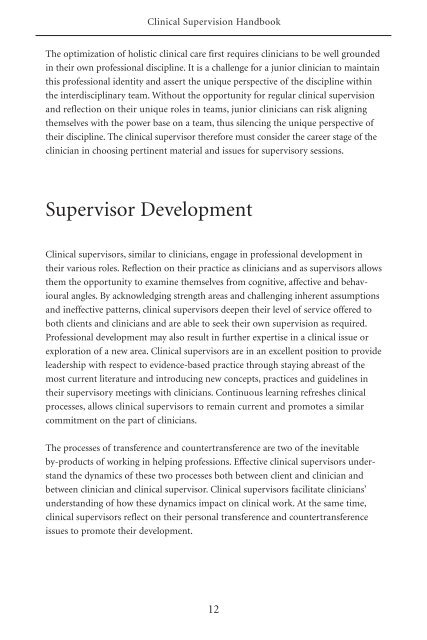Clinical Supervision Handbook - CAMH Knowledge Exchange ..
Create successful ePaper yourself
Turn your PDF publications into a flip-book with our unique Google optimized e-Paper software.
<strong>Clinical</strong> <strong>Supervision</strong> <strong>Handbook</strong><br />
The optimization of holistic clinical care first requires clinicians to be well grounded<br />
in their own professional discipline. It is a challenge for a junior clinician to maintain<br />
this professional identity and assert the unique perspective of the discipline within<br />
the interdisciplinary team. Without the opportunity for regular clinical supervision<br />
and reflection on their unique roles in teams, junior clinicians can risk aligning<br />
themselves with the power base on a team, thus silencing the unique perspective of<br />
their discipline. The clinical supervisor therefore must consider the career stage of the<br />
clinician in choosing pertinent material and issues for supervisory sessions.<br />
Supervisor Development<br />
<strong>Clinical</strong> supervisors, similar to clinicians, engage in professional development in<br />
their various roles. Reflection on their practice as clinicians and as supervisors allows<br />
them the opportunity to examine themselves from cognitive, affective and behavioural<br />
angles. By acknowledging strength areas and challenging inherent assumptions<br />
and ineffective patterns, clinical supervisors deepen their level of service offered to<br />
both clients and clinicians and are able to seek their own supervision as required.<br />
Professional development may also result in further expertise in a clinical issue or<br />
exploration of a new area. <strong>Clinical</strong> supervisors are in an excellent position to provide<br />
leadership with respect to evidence-based practice through staying abreast of the<br />
most current literature and introducing new concepts, practices and guidelines in<br />
their supervisory meetings with clinicians. Continuous learning refreshes clinical<br />
processes, allows clinical supervisors to remain current and promotes a similar<br />
commitment on the part of clinicians.<br />
The processes of transference and countertransference are two of the inevitable<br />
by-products of working in helping professions. Effective clinical supervisors understand<br />
the dynamics of these two processes both between client and clinician and<br />
between clinician and clinical supervisor. <strong>Clinical</strong> supervisors facilitate clinicians’<br />
understanding of how these dynamics impact on clinical work. At the same time,<br />
clinical supervisors reflect on their personal transference and countertransference<br />
issues to promote their development.<br />
12


